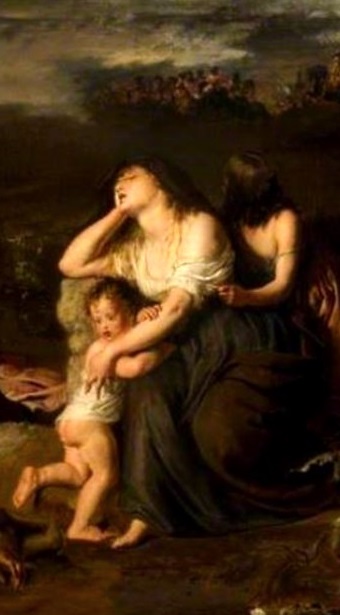 The world will read the printed tale
The world will read the printed tale
Of olden stress and strife,
Of love made pure in furnace-fires,
And faith more dear than life.
But could thy tender eyes to-day
Upon the pages shine,
The hidden tale, to them revealed,
Would glow in every line.
Perchance e’en now, above the stars, “
Beyond these smiles and tears, “
The story others cannot read,
Thy listening spirit hears.
And sweeter strains from one glad harp
In fuller music tell
The lesson, learned in tears below–
“He doeth all things well.”
–Grace Raymond
.
John Brown lived in a house called Priesthill, in the parish of Muirkirk, in the day’s of the Covenant. He was an amiable and blameless man, and had taken no part in the risings or public testifyings of the times. Nevertheless, his hour at last arrived. It was the 30th of April, 1685. John Brown had been at home, and unmolested for some time; he had risen early, and had performed family worship. The psalm sung was the twenty-seventh, and the chapter read the sixteenth of John, which closes with the remarkable words, “In the world ye shall have tribulation; but be of good cheer, I have overcome the world.” His prayer was, as usual, powerful and fervent, for although he stuttered, in prayer he could not but speak fluently in the dialect of heaven. He then went away alone to the hill to prepare some peat-ground.
Meanwhile, Claverhouse had come in late at night to Lesmahagow, where the garrison was posted, had heard of John; had risen still earlier than his victim, and by six on that grey April morning, had tracked him to the moss; had surrounded him with three troops of dragoons, and led him down to the door of his own house.
With the dignity of Cineinnatus, leaving his plough in mid-furrow, John dropped his spade, and walked down, it is said, “rather like a leader than a captive.” His wife was warned of their approach,and, with more than the heroism of an ancient Roman matron, with one boy in her arms, with a girl in her hand, and, alas! With a child within her, Isabel Weir came calmly out to play her part in this frightful tragedy.
Claverhouse was no trifler. Short and sharp was he always in his brutal trade. He asked John at once why he did not attend the curate, and if he would pray for the king. John stated, in one distinct sentence, the usual Covenanting reasons. On hearing it, Claverhouse exclaimed, “Go to your knees, for you shall immediately die!” John complied without remonstrance, and proceeded to pray, in terms so melting, and with such earnest supplication for his wife and their born and unborn children, that Claverhouse saw the hard eyes of his dragoons beginning to moisten, and their hands to tremble, and thrice interrupted him with volleys of blasphemy.
When the prayer was ended, John turned round to his wife, reminded her that this was the day come, of which he had foretold her when he proposed marriage, and asked if she was willing to part with him. “Heartily willing,” was her reply. ” This,” he said, ” is all I desire. I have nothing more now to do but to die.” He then kissed her and the children, and said, “May all purchased and promised blessings be multiplied unto you.” “No more of this,” roared out the savage, whose own iron heart this scene was threatening to move. “You six dragoons, there, fire on the fanatic.” They stood motionless, the prayer had quelled them. Fearing a mutiny, both among his soldiers and in his own breast, he snatched a pistol from his belt and shot the good man through the head. He fell, his brains spurted out, and his brave wife caught the shattered head in her lap.
“What do you think of your husband, now?” howled the ruffian. ” I thought a lot of him, sir, but never so much as I do this day.” “I would think little to lay thee beside him,” he answered. “If you were permitted, I doubt not you would; but how are ye to answer for this morning’s work?” “To men, I can be answerable, and, as for God, I will take him in my own hands.” And, with these desperate words, he struck spurs to his horse and led his dragoons away from the inglorious field.
Meekly and calmly did this heroic and Christian woman tie up her husband’s head in a napkin, compose his body, cover it with her plaid –and not till these duties were discharged did she permit the pent-up current of her mighty grief to burst out, as she sat down beside the corpse and wept bitterly.
—————
Written by, William Adamson

